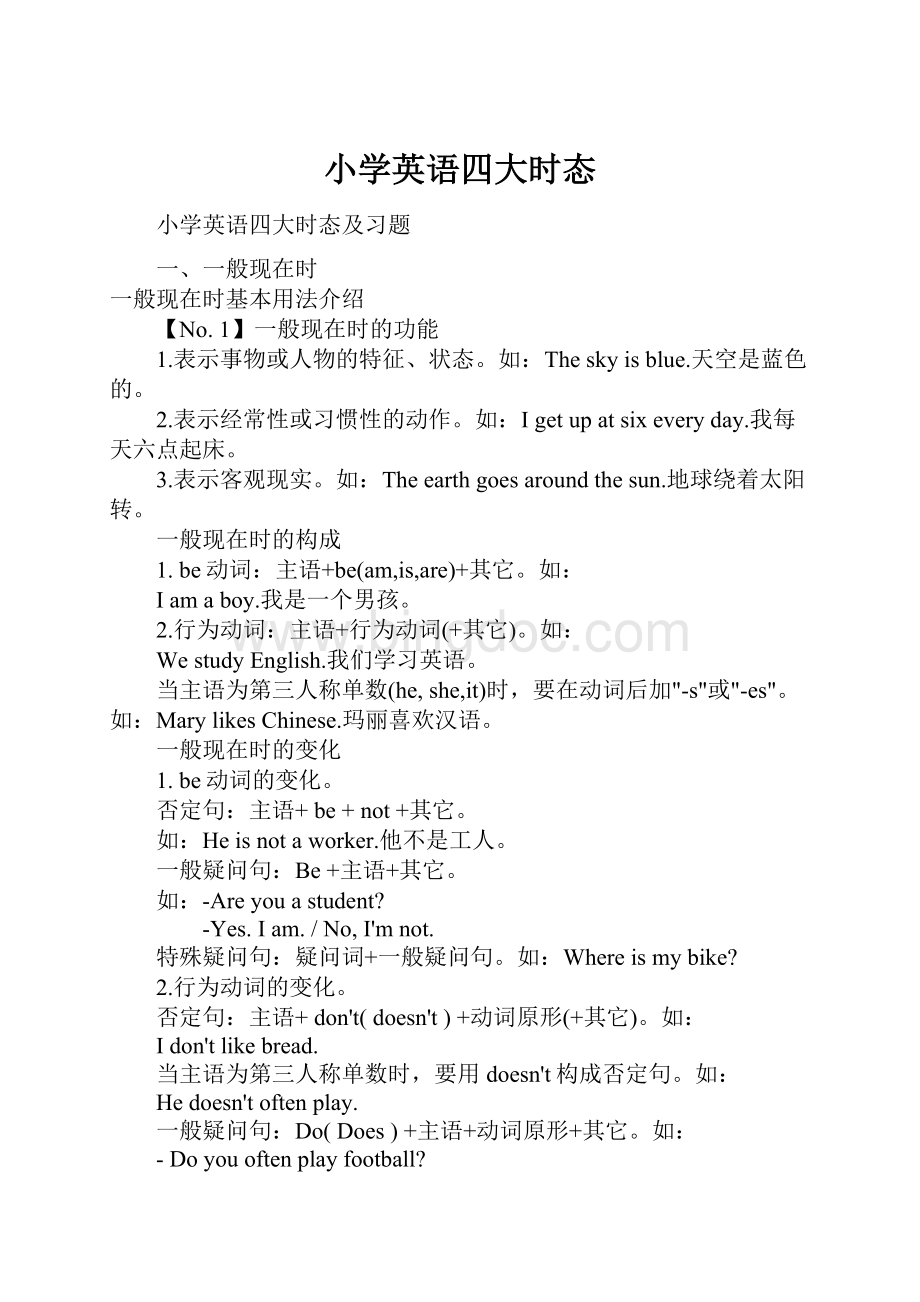小学英语四大时态.docx
《小学英语四大时态.docx》由会员分享,可在线阅读,更多相关《小学英语四大时态.docx(11页珍藏版)》请在冰点文库上搜索。

小学英语四大时态
小学英语四大时态及习题
一、一般现在时
一般现在时基本用法介绍
【No.1】一般现在时的功能
1.表示事物或人物的特征、状态。
如:
Theskyisblue.天空是蓝色的。
2.表示经常性或习惯性的动作。
如:
Igetupatsixeveryday.我每天六点起床。
3.表示客观现实。
如:
Theearthgoesaroundthesun.地球绕着太阳转。
一般现在时的构成
1.be动词:
主语+be(am,is,are)+其它。
如:
Iamaboy.我是一个男孩。
2.行为动词:
主语+行为动词(+其它)。
如:
WestudyEnglish.我们学习英语。
当主语为第三人称单数(he,she,it)时,要在动词后加"-s"或"-es"。
如:
MarylikesChinese.玛丽喜欢汉语。
一般现在时的变化
1.be动词的变化。
否定句:
主语+be+not+其它。
如:
Heisnotaworker.他不是工人。
一般疑问句:
Be+主语+其它。
如:
-Areyouastudent?
-Yes.Iam./No,I'mnot.
特殊疑问句:
疑问词+一般疑问句。
如:
Whereismybike?
2.行为动词的变化。
否定句:
主语+don't(doesn't)+动词原形(+其它)。
如:
Idon'tlikebread.
当主语为第三人称单数时,要用doesn't构成否定句。
如:
Hedoesn'toftenplay.
一般疑问句:
Do(Does)+主语+动词原形+其它。
如:
-Doyouoftenplayfootball?
-Yes,Ido./No,Idon't.
当主语为第三人称单数时,要用does构成一般疑问句。
如:
-Doesshegotoworkbybike?
-Yes,shedoes./No,shedoesn't.
特殊疑问句:
疑问词+一般疑问句。
如:
Howdoesyourfathergotowork?
动词+s的变化规则
1.一般情况下,直接加-s,如:
cook-cooks,milk-milks
2.以s.x.sh.ch.o结尾,加-es,如:
guess-guesses,wash-washes,watch-watches,go-goes
3.以“辅音字母+y”结尾,变y为i,再加-es,如:
study-studies
一般现在时用法专练:
一、写出下列动词的第三人称单数
drink________go_______stay________make________
look_________have_______pass_______ carry____
come________ watch______plant_______fly________
study_______brush________do_________ teach_______
二、用括号内动词的适当形式填空。
1.Heoften________(have)dinnerathome.
2.DanielandTommy_______(be)inClassOne.
3.We_______(notwatch)TVonMonday.
4.Nick_______(notgo)tothezooonSunday.
5.______they________(like)theWorldCup?
6.What_______theyoften_______(do)onSaturdays?
7._______yourparents_______(read)newspaperseveryday?
8.Thegirl_______(teach)usEnglishonSundays.
9.SheandI________(take)awalktogethereveryevening.
10.There________(be)somewaterinthebottle.
11.Mike_______(like)cooking.
12.They_______(have)thesamehobby.
13.Myaunt_______(look)afterherbabycarefully.
14.Youalways_______(do)yourhomeworkwell.
15.I_______(be)ill.I’mstayinginbed.
16.She_______(go)toschoolfromMondaytoFriday.
17.LiuTao_______(do)notlikePE.
18.Thechildoften_______(watch)TVintheevening.
19.SuHaiandSuYang_______(have)eightlessonsthisterm.
20. -Whatday_______(be)ittoday?
-It’sSaturday.三、按照要求改写句子
1.DanielwatchesTVeveryevening.(改为否定句)
___________________________________________________
2.Idomyhomeworkeveryday.(改为一般疑问句,作否定回答)
________________________________________________________
3.Shelikesmilk.(改为一般疑问句,作肯定回答)
___________________________
4.Amylikesplayingcomputergames.(改为一般疑问句,作否定回答)
___________________________________________________
5.Wegotoschooleverymorning.(改为否定句)
_______________________________________________________
6.HespeaksEnglishverywell.(改为否定句)
___________________________________________________
7.Iliketakingphotosinthepark.(对划线部分提问)
________________________________________________________
8.JohncomesfromCanada.(对划线部分提问)
___________________________________________________
9.Sheisalwaysagoodstudent.(改为一般疑问句,作否定回答)
________________________________________________________
10.SimonandDaniellikegoingskating.(改为否定句)
___________________________________________________
五、改错(划出错误的地方,将正确的写在横线上)
1.Is yourbrotherspeakEnglish?
__________________
2.Doeshelikesgoingfishing?
__________________
3.Helikesplaygamesafterclass. __________________
4.Mr.WuteachsusEnglish. __________________
5.Shedon’tdoherhomeworkonSundays._________________
二、现在进行时
1.现在进行时表示现在正在进行或发生的动作,也可表示当前一段时间内的活动或现阶段正在进行的动作。
2.现在进行时的肯定句基本结构为be+动词ing.
3.现在进行时的否定句在be后加not。
4.现在进行时的一般疑问句把be动词调到句首。
5.现在进行时的特殊疑问的基本结构为:
疑问词+be+主语+动词ing?
但疑问词当主语时其结构为:
疑问词+be+动词ing?
动词加ing的变化规则
1.一般情况下,直接加ing,如:
cook-cooking
2.以不发音的e结尾,去e加ing,如:
make-making,taste-tasting
3.如果末尾是一个元音字母和一个辅音字母,双写末尾的辅音字母,再加ing,如:
run-running,stop-stopping
现在进行时专项练习:
一、写出下列动词的现在分词:
play________run__________swim_________make__________
go_________like________ write_________ski___________
read________have_________sing ________dance_________
put_________see________buy_________love____________
live_______take_________come________ get_________
stop_________sit________begin________shop___________
二、用所给的动词的正确形式填空:
1.Theboy__________________(draw)apicturenow.
2.Listen.Somegirls_______________(sing)intheclassroom.
3.Mymother_________________(cook)somenicefood now.
4.What_____you______(do)now?
5.Look.They_______________(have)anEnglishlesson.
6.They____________(not,water)theflowersnow.
7.Look!
thegirls________________(dance)intheclassroom.
8.Whatisourgranddaughterdoing?
She_________(listen)tomusic.
9.It’s 5 o’clocknow.We_____________(have)suppernow
10.______Helen____________(wash)clothes?
Yes,sheis.
三、句型转换:
1.Theyaredoinghousework.(分别改成一般疑问句和否定句)
_____________________________________________________________
_____________________________________________________________
2.Thestudentsarecleaningtheclassroom.(改一般疑问句并作肯定和否定回答)
_________________________________________________________________
_________________________________________________________________
3.I’mplayingthefootballintheplayground.(对划线部分进行提问)
_________________________________________________________________
4.Tomisreadingbooksinhisstudy.(对划线部分进行提问)
三、将来时
一、概念:
表示将要发生的动作或存在的状态及打算、计划或准备做某事。
句中一般有以下时间状语:
tomorrow,nextday(week,month,year…),soon,thedayaftertomorrow(后天)等。
二、基本结构:
①begoingto+do;
②will+do.
三、否定句:
在be动词(am,is,are)后加not或情态动词will后加not成won’t。
例如:
I’mgoingtohaveapicnicthisafternoon.→I’mnotgoingtohaveapicnicthisafternoon.
四、一般疑问句:
be或will提到句首,some改为any,and改为or,第一二人称互换。
例如:
Wearegoingtogoonanoutingthisweekend.
→Areyougoingtogoonanoutingthisweekend?
五、对划线部分提问。
一般情况,一般将来时的对划线部分有三种情况。
1. 问人。
Who例如:
I’mgoingtoNewYorksoon.→Who’sgoingtoNewYorksoon.
2. 问干什么。
What…do.
例如:
Myfatherisgoingtowatcharacewithmethis afternoon.
→Whatisyourfathergoingtodowithyouthisafternoon.
3. 问什么时候。
When.例如:
She’sgoingtogotobedatnine.
→Whenisshegoingtobed?
六、同义句:
begoingto=will
Iamgoingtogoswimmingtomorrow(明天).=Iwillgoswimmingtomorrow.
练习:
填空。
1.我打算明天和朋友去野炊。
I_____________________haveapicnicwithmyfriends.
I________haveapicnicwithmyfriends.
2.下个星期一你打算去干嘛?
我想去打篮球。
What___________________________________________nextMonday?
I__________________playbasketball.
What_________youdonextMonday?
I________playbasketball.
3.你妈妈这个周末去购物吗?
是,她要去买一些水果。
_____yourmother_______________goshoppingthis___________?
Yes,she_________.She________________________buysomefruit.
4.你们打算什么时候见面。
Whattime_______you___________________meet?
改句子。
5.Nancyisgoingtogocamping.(改否定)
Nancy________goingtogocamping.
6.I’llgoandjointhem.(改否定)
I_______go______jointhem.
7.I’mgoingtogetupat6:
30tomorrow.(改一般疑问句)
_______________________togetupat6:
30tomorrow?
8.Wewillmeetatthebusstopat10:
30.(改一般疑问句)
_______________meetatthebusstopat10:
30.
9.Sheisgoingtolistentomusicafterschool.(对划线部分提问)
_______________she_________________________afterschool?
四.一般过去时:
1.动词一般过去时,表示过去发生的事;be用was或用were,have,has变had;
谓语动词过去式,过去时间作标志;一般动词加-ed,若是特殊得硬记。
否定句很简单,主语之后didn’t添;疑问句也不难,did放在主语前;不含be动词时如果谓语之前有did,谓语动词需还原;
动词若是was,were,否定就把not添。
含be动词时疑问句也不难,要把was,were放在主语前。
2.经常能见到一些表示过去的时间状语,如:
yesterday,lastweek/month…,threedaysago等。
3、动词过去式。
1、规则动词的过去式,是有规律可循的。
具体的变化规则如下:
(1)一般情况在动词词尾加-ed,如:
play--played,visit--visited
(2)不发音的e结尾的动词,直接加-d,如:
live--lived,taste--tasted
(3)以辅音字母+y结尾的动词,变y为i,再加-ed,如:
fly--flied,study--studied
(4)以重读闭音节只有一个辅音字母结尾的动词,双写词尾的辅音字母再加-ed,如:
swim-swimmed,stop-stopped.
4.注意:
规则动词词尾加-ed有三种读音:
a.在清辅音后读作[t]。
如:
asked,helped,watched,stopped
b.在浊辅音和元音后读作[d]。
如:
enjoyed,studied,moved,called
c.在t/d后读作[id]。
如:
wanted,needed
5.、不规则变化要牢记:
have/has--had,do--did,am/is—was,are—were,go—went,eat—ate,see—saw,take--took,run--ran,send--sent,sleep--slept.read—read,hurt—hurt,
一、单项选择:
从下列各题后所给的四个选项中选择最佳答案填空。
(10)
()1.Myfather______illyesterday.
A.isn'tB.aren'tC.wasn'tD.weren't
()2.______yourparentsathomelastweek﹖
A.IsB.WasC.AreD.Were
()3.Thetwins______inDalianlastyear.They______herenow.
A.are;wereB.were;areC.was;areD.were;was
()4.______yourfatheratworktheday_____yesterday﹖
A.Was;beforeB.Is;beforeC.Was;afterD.Is;after
()5.—WhowasondutylastFriday﹖
—______.
A.IamB.IwasC.Yes,IwasD.No,Iwasn't
()6.Icleanedmyclassroom___________
AwiththreehoursBthreehoursago
CinthreehoursDthreehoursbefore
()7.Icame_______myhousetwodaysago.
AbackonBbacktoCtobackDback
()8.___________?
Hedidsomereadingathome.
AWhatdoesyourfatherdoyesterdayevening
BWhatdoesyourbrotherdointheschool
CWhatdidyourbrotherdoovertheweekend
DWheredidyourbrothergolastSunday
()9.Whatdidyoudo________?
Iwenttothemovies.
AnextmorningBovertheweekendCintheweekendDnextMonday
()10.Thekoalasleeps_______,butgetsup_________.
Aduringtheday;attheeveningBatday;duringnight
Cintheday;duringtheeveningDduringtheday;atnight
二、请用正确动词形式填空。
(10)
1.I_________(have)anexcitingpartylastweekend.
2._________she_________(practice)herguitaryesterday?
No,she_________.
3.What________Tom________(do)onSaturdayevening?
He________(watch)TVan